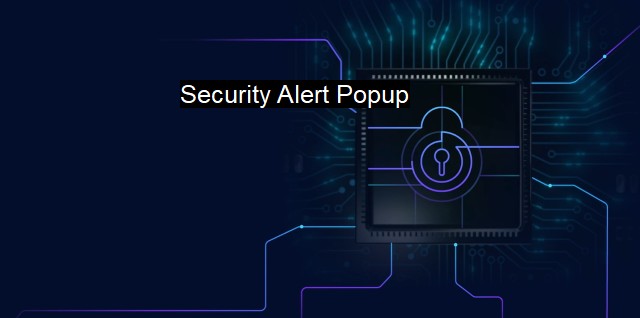What is Security Alert Popup?
Why Security Alert Popups Are Critical for Your Computer's Safety: Insights on Antivirus and Cybersecurity Products
A "Security Alert Popup" is a notification that appears on your desktop or mobile device intended to inform you about a potential threat to your system or network. In this context, it is traditionally associated with cybersecurity and antivirus software and plays a pivotal role in protecting your digital assets and information from external threats or attacks.Primarily, a security alert popup could be generated by an antivirus software, a protective shield on your system specifically designed for preemptively protection against harmful threats like viruses, malware, ransomware or phishing attacks. An antivirus software constantly scans, monitors, and analyzes files, emails, online activities, system memory, and anything that can make it suspicious considering the high risk of cyber threats.
When your antivirus software detects suspicious activity or detects a potential threat, it generates a "security alert popup," on your screen notifying that some action is required. This action might either be giving the antivirus permission to quarantine or delete a virus-infected file, install software updates for better protection, advise change of password in case of a password breach or implement stronger packets firewall. Sometimes, the security alert might just be about informative notifications like expired subscriptions or reminders for regular system scans.
This aspect of security assurance is critical because the majority of attacks include nefarious software running scripts in the background, eventually leading to data theft, identity theft, or other sources of fraud and losses. Everyone interacting with systems on the internet needs to understand that the oblivious act of downloading software or files from untrusted sources or frequently visiting potentially harmful sites could induce significant damage to their digital life.
While security alert popups emerge as a significant utility in ensuring the cybersecurity landscape, it's crucial to realize that not all popups are created, keeping interest of the user in mind. A considerable fraction of these popups are a part of the problem themselves. Cybercriminals use fake "security alert popups", commonly called "scareware," to trick victims into downloading malicious software or revealing sensitive information by taking actions like 'clicking a file/link’ or ‘entering details for identity verification'. People owing to fear induced by these alerts become easy victims of such weak social engineering tactics.
Owing to the combined package of benefits as well challenges posed by these popups, it becomes imperative for users to consider these pop-ups with both seriousness and skepticism. Monitoring the alert for signs of legitimacy like the software's name and symbol, ability to interact, correct grammar, etc., are small yet effective steps towards validating the genuineness of such popups.
It's highly recommended to have effective cybersecurity measures such as the latest antivirus software which are better equipped to distinguish between the threats and the claims made by the threats themselves. With this, users should always endeavor to increase their technological cognizance and develop caution for continually evolving scenarios pertaining to cyber threats.
"Security Alert Popups," despite the pros and cons it brings, serves as an indispensable tool in the digital world. They command absolute attention and must not be dismissed arbitrarily. Instead, users should appreciate the critical role they play in system security while maintaining an appropriate level of skepticism towards potential false alerts. Being aware and acting responsibly can go a long way in maintaining the integrity of our information in this digital age. The right use can turn these perceived interruptions into remarkable lifeguards in the sea of digital threats.

Security Alert Popup FAQs
What should I do if I see a security alert popup on my computer?
If you see a security alert popup on your computer, take it seriously and do not ignore it. Follow the instructions given in the popup, which may include running a virus scan or updating your antivirus software. If the popup is unexpected or appears suspicious, do not click on any links or provide any personal information.Are security alert popups always legitimate?
No, not all security alert popups are legitimate. Some fake popups can be created by malicious actors to trick you into downloading malware or providing personal information. Always verify the source of the popup and be cautious when clicking on links or providing information.How can I prevent security alert popups from appearing on my computer?
To prevent security alert popups from appearing on your computer, make sure you have a reliable antivirus software installed and up-to-date. Also, avoid downloading and installing software from untrusted sources and be cautious when opening email attachments or clicking on links. Regularly backing up your important data can also help protect you in case of a cyber attack.What should I do if a security alert popup informs me that my computer has been infected with a virus?
If a security alert popup informs you that your computer has been infected with a virus, immediately run a thorough virus scan using your antivirus software. If the virus cannot be removed or if the security of your personal information is at risk, seek professional help from a cybersecurity expert. Take steps to prevent the virus from spreading to other devices, such as disconnecting from the internet and isolating infected devices.| | A | | | B | | | C | | | D | | | E | | | F | | | G | | | H | | | I | | | J | | | K | | | L | | | M | |
| | N | | | O | | | P | | | Q | | | R | | | S | | | T | | | U | | | V | | | W | | | X | | | Y | | | Z | |
| | 1 | | | 2 | | | 3 | | | 4 | | | 7 | | | 8 | | |||||||